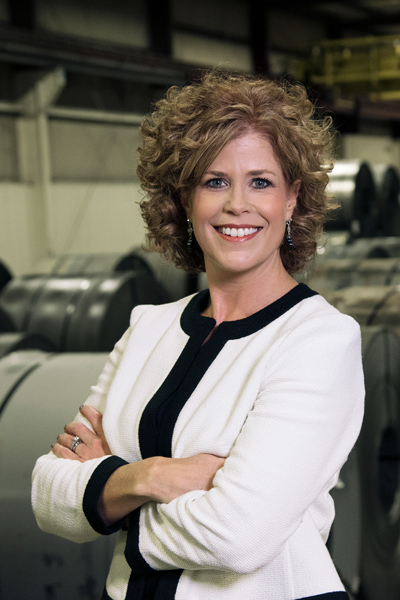
When your employees spend the day handling colossal, 5,000–40,000-pound tightly wound mega coils of steel and revenue depends on how well you negotiate complex contracts with major manufacturers, it’s definitely a risky business. That’s where Michelle Harper comes in.
“I think everything I do every day is about risk mitigation. That’s the role of a general counsel. It’s almost like you’re trying to rank the risks. You don’t want to turn a blind eye to them, but you also don’t want to pick a contract completely apart and shut the deal down to avoid small risks. Nothing would ever get done,” Harper explains. “So I like to use my role to be someone who is there to counsel, advise, and assess the benefits of those risks, rather than be the roadblock.”
Formerly the assistant general counsel, Harper has recently shifted positions into the seat of vice president, general counsel, and secretary of Steel Technologies, a Kentucky-based flat-rolled steel and aluminum processing company with more than 1,800 employees across eight states, Mexico, and Canada.
Since earning the general counsel seat, Harper’s focus has transitioned from issues such as labor and employment, OSHA regulations, litigation, and workers’ compensation to corporate governance, transactional work, and providing guidance on her former responsibilities to her all-women team. “One of the biggest challenges has been to parse off and let go of things I used to take care of day-to-day,” she says. “You just can’t do both jobs. But it’s hard not to want to manage everything I’ve always managed for years plus the new things I’m responsible for managing.”
In leading the entire legal department, Harper has now set her sights on humanizing and streamlining the company’s legal department to make it more accessible to employees. “Sometimes I think attorneys get a bad rap as being difficult, and people dread having to involve lawyers,” she says. “What I want within the company is for people to feel like they can come to our team for advice and assistance any time. I don’t want our legal department to bottleneck anything. My goal is definitely to continue making our department more organized, efficient, and a little nimbler.”
The first major step in achieving these goals is a new legal management system that will remove unnecessary obstacles in the contracting process and grant Harper’s team the chance to tackle one of the main challenges the department has faced: time constraints. “It’s going to help us work much more effectively because we’ll be able to look back and easily see how we’ve handled other contracts and situations in the past,” she says. “I’d also like for it to be a way for any lawyer in the group to be able to pick up where one of us has left off as work ebbs and flows.”
This new system will also facilitate more access to data in general, which will help her team adhere to a clear project timeline. Once the Steel Technologies sales team anchors a prospective deal, Harper’s legal team will be able to quickly interface with various versions of sales contracts from partnering clients and vendors, thus bringing the department up to pace in the digital age.
“More and more, companies today are starting to put the terms and conditions of their contacts online,” Harper explains. “It can be both a blessing and a curse.” Although updating and revising contracts might be easier now, technology has also enabled companies to tuck lengthy terms and conditions away on their websites and claim that customers are subject to them even if they may not be actually included within the body of the contract. What seems like a ten-page contract on paper might actually add up to be more than seventy-five pages of supplementary material. In turn, this increases the amount of contract review and analysis required by legal functions.
“That type of situation is one of the times I think the legal department definitely seems like a roadblock because our company moves fast from a sales perspective,” Harper says. “One of the goals I have is to be a partner within our organization. I like to think of the other departments as clients, and I want our legal team to operate more like a speed bump than a roadblock. We don’t have to stop doing business with a customer, but we do have to slow down and look around to make sure we aren’t missing something important.”
Harper also emphasizes the merits of coming to work in a truly positive mood and forging genuine relationships with colleagues at all levels of the business. “I always try to come to work with a smile on my face,” she says. “I don’t see the need to be a rude or pushy attorney. If you have to be tough, then you have to be tough, but I don’t think that has to be your first approach to be effective.”
Harper’s humanizing approach to the role of general counsel also benefits the company by making it easier to sidestep unnecessary litigation costs. “In general, we have very little litigation across the board—whether that’s commercial or employment-related litigation. I think it’s a function of our company and the way we approach things, and I think that speaks highly to our company’s culture and the way we seek to manage issues before they become something bigger,” Harper says. “In fact, I can literally count the number of labor and employment lawsuits we’ve had in the past ten years on one hand. We generally win or resolve any employment-related issues in-house.”
Harper explains that many issues are largely settled through mutual negotiation and, if necessary, for a nominal amount. By considering the needs and perspectives of all Steel Technologies employees, Harper is able to cultivate a highly cooperative environment. “There’s always a legal side and a human side to every situation,” Harper says. “We strive to consider the human element. Approaching it from both perspectives makes Steel Technologies a great place to work and will make us even more successful in
the future.”
Strong General Counsel-Law Firm Relationships Help Steel Technologies Succeed
Michelle works closely with Frost Brown Todd to anticipate risks and opportunities, while collaborating on efficient handling of legal matters. “Our partnership enhances the legal services we provide by allowing us to support the unique business goals of the company,” says Jeremiah Byrne, Frost Brown Todd Attorney.
Photo: Sam English

